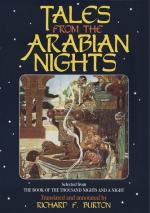—Chafariz,
Joam Antam e a Matriz:
which may be roughly rendered
—Parish
church,
on the Green and Johnny Birch.
[FN#6] [Here I suppose the scribe dropped a word, as “yaht j,” or the like, and the sentence should read: it requires, etc.—st.]
[FN#7] In text “S rayah,” for “Sar yah,” Serai, Government House: vol. ix. 52.
[FN#8] A manner of metonymy, meaning that he rested his cheek upon his right hand.
[FN#9] For the sig. of this phrase=words suggested by the circumstances, see vol. i. 121.
[FN#10] Mr. Charles M. Doughty ("Arabia Deserta,” i. 223) speaks of the Badawin who sit beating the time away, and for pastime limning with their driving-sticks (the B k£r) in the idle land.”
[FN#11] In text “Lam yanub al-W hidu min-hum nisf haff n.” [I cannot explain this sentence satisfactory to myself, but by inserting “ill ” after “min-hum.” Further I would read “nassaf"=libavit, delibavit degustavit (Dozy, Suppl. s. v.) and “Hif n,” pl. of “Hafna"=handful, mouthful, small quantity, translating accordingly: “and none took his turn without sipping a few laps.”—St.]
[FN#12] “Tarajjama”: Suppl. vol. iv. 188. I shall always translate it by “he deprecated” scil. evil to the person addressed.
[FN#13] [The text, as I read it, has: “In wahadtu (read wajadtu) f¡ h zih al-S ’ h shayyan naakul-hu wa nam£t bi-hi nart h min h z al-Taab wa’l-mashakkah la-akultu-hu"=if I could find at this hour a something (i.e. in the way of poison) which I might eat and die thereby and rest from this toil and trouble, I would certainly eat it, etc.—st.]
[FN#14] See vol. i. 311 for this “tom-tom” as Anglo-Indians call it.
[FN#15] i.e. Whereinto the happy man was able to go, which he could not whilst the spell was upon the hoard.
[FN#16] Here ends this tale, a most lame and impotent conclusion, in the W. M. Ms. iv. 189. Scott (p. 244 5) copied by Gauttier (vi. 348) has, “His father received him with rapture, and the prince having made an apology to the sultana (!) for his former rude behaviour, she received his excuses, and having no child of her own readily adopted him as her son; so that the royal family lived henceforth in the utmost harmony, till the death of the sultan and sultana, when the prince succeeded to the empire.”
[FN#17] W.M Ms. iv. 189. Scott (vi. 246-258) “Story of the Lovers of Syria, or, the Heroine:” Gauttier (iv. 348-354) Histoire des Amans de Syrie.
[FN#18] Scott (vi. 246) comments upon the text:—“The master of the ship having weighed anchor, hoisted sail and departed: the lady in vain entreating him to wait the return of her beloved, or send her on shore, for he was captivated with her beauty. Finding herself thus ensnared, as she was a woman of strong mind . . . she assumed a satisfied air; and as the only way to preserve her honour, received the addresses of the treacherous master with pretended complacency, and consented to receive him as a husband at the first port at which the ship might touch.”




